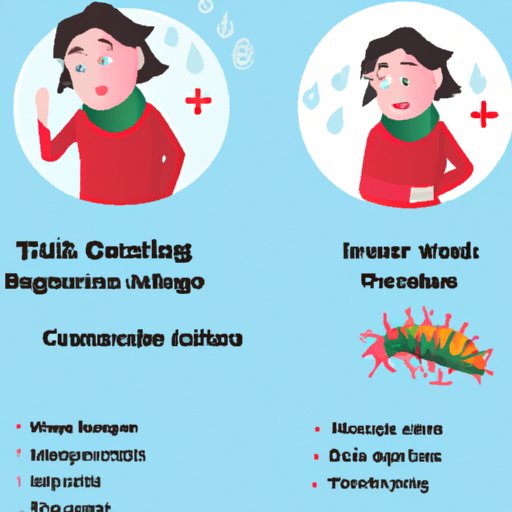Introduction
A cold is one of the most common illnesses, and it’s something that almost everyone will experience at least once in their lifetime. When you have a cold, you may be wondering how long you are contagious for, and if there are any steps you can take to help prevent spreading the virus. This article will explore the science behind how long you are contagious after a cold, and provide some tips for mitigating the spread of the virus.
The Science of How Long You Are Contagious After a Cold
When it comes to determining how long you are contagious after a cold, there are several factors that need to be considered. The first is how long the cold virus lasts. Most cold viruses can survive outside of the body for up to 48 hours, which means they can be spread through contact with contaminated surfaces or objects. However, the length of time a cold virus can survive depends on environmental factors such as temperature, humidity, and air quality.
The next factor to consider is the symptoms of a cold. Common cold symptoms include runny nose, sore throat, sneezing, coughing, and congestion. These symptoms usually start within one to three days after exposure to the virus, and can last anywhere from two to fourteen days. The length of time that you are contagious after a cold depends on when the symptoms begin and how long they last.
The last factor to consider is how a cold is spread. A cold is caused by a virus, and it is typically spread through contact with infected droplets from an infected person’s nose or mouth. These droplets can be spread through talking, coughing, or sneezing. The virus can also be spread through contact with contaminated surfaces or objects.

How to Tell When You Are No Longer Contagious After a Cold
Once you have been exposed to the cold virus, it can take up to seven days for the symptoms to appear. Once the symptoms have started, you are likely to be contagious for around five to seven days. However, this can vary depending on the individual and the severity of the cold. To determine when you are no longer contagious after a cold, monitor your symptoms and look for signs that they are improving. Once your symptoms have gone, you are likely to no longer be contagious.

How to Help Prevent Spreading a Cold After You Have One
If you have a cold, there are several steps you can take to help prevent spreading the virus. First, it is important to practice good hygiene. This means washing your hands regularly with soap and water, using hand sanitizer when soap and water are not available, and avoiding touching your eyes, nose, and mouth. Second, try to avoid close contact with others, especially those who are more vulnerable to illness such as young children and elderly people. Third, wear a mask when you are around other people. Wearing a mask can help to reduce the spread of respiratory droplets that contain the virus.
What to Do If You’re Contagious After a Cold
If you think you may be contagious after a cold, it is important to take precautions to prevent spreading the virus. The best thing to do is to isolate yourself from others, meaning staying home and avoiding contact with other people. If you must leave your home, make sure to wear a face covering and practice social distancing. You should also avoid sharing items such as dishes, utensils, and towels with other people.

How To Mitigate the Spread of a Cold After You Have One
In addition to taking steps to prevent the spread of a cold, there are also some things you can do to help mitigate the spread of the virus. One of these is to get vaccinated against the common cold. Vaccinating against the common cold can help protect you from getting sick and can also help reduce the spread of the virus. Another way to help mitigate the spread of a cold is to boost your immune system. Eating a healthy diet, getting enough sleep, exercising regularly, and reducing stress can all help to strengthen your immune system and reduce your risk of getting a cold.
How Long Should You Stay Home After a Cold?
The length of time you should stay home after a cold depends on the severity of the illness and the guidelines set by healthcare providers. Generally, it is recommended that you stay home until you are feeling better and all of your symptoms have gone away. Some healthcare providers may recommend staying home for up to 14 days after the onset of symptoms, but this can vary depending on the individual.
How Long Is the Incubation Period for a Cold?
The incubation period for a cold is the time between being exposed to the virus and when symptoms start to appear. On average, the incubation period for a cold is one to three days, but this can vary depending on factors such as age, health, and the strain of the virus. For example, younger children tend to have shorter incubation periods than adults.
Conclusion
In conclusion, understanding how long you are contagious after a cold can help you take steps to prevent the spread of the virus. The length of time you are contagious depends on the length of time the cold virus lasts, the severity of the symptoms, and how it is transmitted. To determine when you are no longer contagious after a cold, monitor your symptoms and look for signs that they are improving. Finally, remember to practice good hygiene, avoid close contact with others, wear a mask, and take steps to boost your immune system to help mitigate the spread of the virus.
(Note: Is this article not meeting your expectations? Do you have knowledge or insights to share? Unlock new opportunities and expand your reach by joining our authors team. Click Registration to join us and share your expertise with our readers.)
